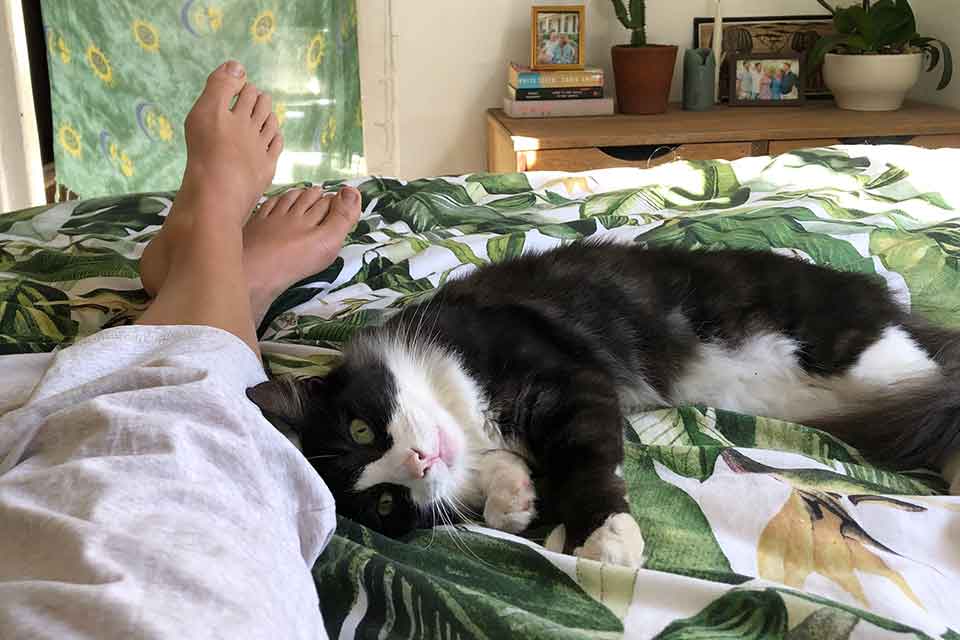What Count Alexander Ilyich Rostov Taught Me about Quarantine: Lessons on Confinement and Camaraderie from Amor Towles’s A Gentleman in Moscow

“By the smallest of one’s actions, one can restore some sense of order to the world.”—Amor Towles
Under lockdown with her four roommates in Cape Town, South Africa, SarahBelle Selig recalls all that a beloved novel taught her about living in isolation.
What do I read? How do I keep sane and prevent my life from becoming The Shining? And please, someone tell me—Do I pair the bottle of Rioja or the Mukuzani with my Latvian stew? If you’re like me, you’ve got a lot of questions about how to entertain yourself during the Covid-19 shutdown. But before you double down on another series and that second bowl of pasta, let me tell you a few things I learned from my pal Count Alexander Ilyich Rostov, the master of how not to feel isolated when you’re isolated.
 Amor Towles’s 2016 novel, A Gentleman in Moscow, follows Count Rostov, an aristocrat under the Tsarist regime who in 1922 (in lieu of being shot—a cause for celebration, no doubt) is sentenced by his new Bolshevik comrades to spend the rest of his life under house arrest in Moscow’s Metropol Hotel. In the years that follow, Count Rostov learns a lot about living a big life in a small space, aided by a bizarre crew of maître d’s, chefs, tailors, and a clever nine-year-old hotel guest, Nina Kulikova, who is hell-bent on learning the secrets of the Metropol.
Amor Towles’s 2016 novel, A Gentleman in Moscow, follows Count Rostov, an aristocrat under the Tsarist regime who in 1922 (in lieu of being shot—a cause for celebration, no doubt) is sentenced by his new Bolshevik comrades to spend the rest of his life under house arrest in Moscow’s Metropol Hotel. In the years that follow, Count Rostov learns a lot about living a big life in a small space, aided by a bizarre crew of maître d’s, chefs, tailors, and a clever nine-year-old hotel guest, Nina Kulikova, who is hell-bent on learning the secrets of the Metropol.
Count Rostov’s Ten Rules for Indoor Living
1. Live a life of the “purposefully unrushed.” The unexpected transition to a house-bound lifestyle might have some of us a little high-strung, as we try to balance a full work schedule, watching the news, suffering through dreaded at-home workouts, and the inevitable phone call from a bored relative. Take a breath and prioritize, but don’t let your work spill over into important recuperation time. “When all was said and done,” the count argues, “the endeavors that most modern men saw as urgent . . . probably could have waited, while those they deemed frivolous (such as cups of tea and friendly chats) had deserved their immediate attention.” Channel your inner aristocrat and take some shameless breaks from the computer to attend to personal matters.
Abandon your FOMO . . .
2. Abandon your FOMO. Fear of missing out? Careful, the count warns: “Imagining what might happen if one’s circumstances were different is the only sure route to madness.” First of all, it’s pretty unnecessary, because literally everyone else you know is stuck at home, too. But besides that, having an empty social schedule is a great opportunity to assess how you spend your time, and with whom. Does an activity or a person bring you joy—or bring you down? Is it necessary, or is it just stressing you out? If you’re really into this idea, go into your day planner and check out the last few months. Circle the experiences you remember the most fondly and the ones that produced a positive outcome. Then check out the events left not circled. As the count’s dear friend Richard Vanderwhile would say: “I’m quite fond of being left behind. It always gives me a whole new perspective on wherever it was I thought I was leaving.”
3. Eat and drink like a twentieth-century aristocrat. When you’re working from home, it’s easy to toss back those leftovers like you’re eighteen and it’s Taco Bell, and it’s only on your last bite that you remember to actually taste something. Cook a long meal (you’ve got the time), use the whole spice rack, and then eat it really slow like its Emile’s bouillabaisse and you had to smuggle the saffron across continents. And to top it off: learn how to pair your wines. For Count Rostov, that means a bottle of Baudelaire with fish, Grand Cru with roasted duck, and a Barolo with the osso buco. We may be stuck at home, and maybe we can only afford a six-dollar bottle of Cab, but that doesn’t stop us from being classy.
4. Revamp your space. You don’t need to jump on the Marie Kondo bandwagon to make your place ~zen af~. It’s time to declutter and donate! As the count enlightens us, “We come to hold our dearest possessions more closely than we hold our friends. We carry them from place to place, often at considerable expense and inconvenience . . . while allowing memories to invest them with greater and greater importance. . . . But, of course, a thing is just a thing.” Walk around your space and pick only the most important things to keep by saying Count Rostov’s magic words: “This. That. Those. All the books.”
Read the classics . . . or don’t.
5. Read the classics . . . or don’t. Speaking of books, you know those classics on your bookshelf you’ve been guilting yourself over—you know, the ones that “promise heft and threaten impenetrability”? Count Rostov knows the feeling. I have never observed such quiet desperation as I did watching the count try to conquer the volumes of Montaigne, which he (mercifully) abandons for an old favorite. If you get fired up by the classics section at your local indie, kudos to you—read on. But if you’re a mere mortal like the rest of us, stop pretending to read your high-school syllabus and pick up something you’ll actually enjoy. Or how about rereading a book you loved years ago? This is my second read of A Gentleman, and I savored every bite. In the words of Count Rostov, “How could one possibly accuse him of nostalgia or idleness, of wasting his time simply because he had read the story two or three times before?” Take a page from the count’s book and use the classics to fix that wobbly three-legged armoire.
6. Break down your walls. Okay, maybe rein it in a bit on this one. The count might actually knock down his hotel room walls in the Metropol, but I’m talking about your personal walls here. Find a mindfulness meditation on YouTube, dust off that journal, or take the Proust Questionnaire with your roommates. Open yourself up to discussions you don’t have the headspace for—or maybe the courage for—in your normal day-to-day. Your mental state is a critical component of your health, so use this opportunity to discover, challenge, and expand your own views or learn more about the people with whom you share your space. Come to terms with your circumstances or make an actionable plan to change them. Like the count says, “If one does not master one’s circumstances, one is bound to be mastered by them.”
7. Invest in gold and silver. This is an easy one. Money in the bank is fickle, titles are just words (just ask “Comrade” Rostov), and every empire—no matter how soignée!—must fall. But you never know when a table leg chock-a-block with gold coins will come in handy. Seriously, though, do some googling; with a tumultuous stock market, it’s a really good time to invest in precious metals.
8. Explore the indoors. How well do you actually know your home? Where’s the best place to enjoy the afternoon sun, or hear the rain on the pavement? What’s actually on top of your kitchen cupboard, or behind those coats in the hall closet? Where’s the best hiding spot? Follow Nina Kulikova’s lead and discover your own hotel’s best-kept secrets, but if you must spy on your fellow guests (read: roommates) from hidden passageways, try not to rip your custom Savile Row satin pants this time.
9. Master your appearance. Yes, those stretchy pants are tempting—and truth be told, I am wearing them while I write this—but Count Rostov is a firm believer in dressing for the occasion, and for the count, every occasion is one that requires one’s complete arsenal of charm. Want to be nimble with a thimble? Learn how to sew on a button or stitch up that hole in those satin pants. You’ll use this skill more often than you think, especially if you’re sleuthing around the hotel with Nina.
Adopt a stray.
10. Adopt a stray. Count Rostov finds love in a hopeless place with a one-eyed cat named Kutuzov, who wanders into the count’s quarters and promptly decides to cohabit. With businesses closing left and right, local shelters are in desperate need of foster parents for their terrier tenants. Why not do a kind thing and score some extra cuddles? Extra points if you get a cat with one eye.
Aristocratic Activities While Physical Distancing
Twiddling your thumbs, or stuck on the mindless scroll? While away the hours on that twice-tolling clock by trying out a few of the count’s favorite pastimes:
Learn to tell a really good story.
1. Learn to tell a really good story. Whether it’s about a blacksmith’s son, or traveling sea merchants, or the time you got locked in the wine cellar with the young baroness, always have a story on hand to charm your friends or outwit your foes. Don’t be afraid of tangents (as the count’s two-page-long asterisk on page 100 tells us, it’s okay to get a little sidetracked). They’re a little extra spice in the stew.
2. Play a game of Zut. This is an evening favorite of Count Rostov and his young companion, Sofia. Have one friend propose a category, like black-and-white animals, or famous foursomes (Earth, water, wind, fire? The four card suits?), then go back and forth and say an item in that category until one player stumbles. Best two out of three wins, to whatever consequence you decide. Zut is the name of the game, just don’t let your kids Google Translate it.
3. Try your hand at writing. Have you been known to “fence with a quill”? And by that, I mean, do you sometimes make coherent sentences appear on Microsoft Word? Why not sit down for an hour and give it a proper try? Of his famous poem, the count explains, “I simply happened to be sitting at the particular desk on the particular morning when it chose to make its demands.” Sit, my friends, and let the Muse come to you! And remember, “A king fortifies himself with the castle, a gentleman with a desk.” Choose yours wisely! Just try not to write anything that pisses off the Bolsheviks.
5. Take a mental walk. From the newspaper stand on Tverskaya Street, say hello to the ladies from Filippov’s, head to the Galerie Bertrand for the newest exhibition, and circle back through the Alexander Gardens toward noon. . . . Like the count enjoying a Moscow morning from afar, try closing your eyes and taking a long stroll through your town, step by step, remembering and imagining every detail of the people, sounds, and colors. How do the lilacs smell in the spring?
Amor Towles’s A Gentleman in Moscow is 462 pages of pure comfort food. Everything about this book—the names (Konstantin Konstantinovich, Mikhail Fyodorovich Mindich, Anna Urbanova), the dishes (the lamb, the roasted bass), the literary references (ah, beloved Tolstoy!)—provokes nostalgia for a country and an era with which the reader most likely has no personal attachment. And no, you don’t have to be familiar with Russian history to love this book; I certainly was not. No matter where you’re cooped up or who you’re cooped up with, the count’s mastery of charm and chivalry soothes the self-isolated’s palate like a nightcap at the Metropol’s Shalyapin Bar.
Most of the world is under lockdown right now. Some of us are stocking up on booze and buying Disney+ memberships, or we’re finding ways to bring our workaholism home, setting up double or triple screens, and packing our schedule with conference calls. That’s all fine, but either way, we’re overlooking the opportunity to overhaul our lifestyles, think deeply, and cultivate relationships. In these uncertain times, let’s turn to our literary comrades for guidance, and prove truthful the count’s faith that “by the smallest of one’s actions, one can restore some sense of order to the world.”
Cape Town












